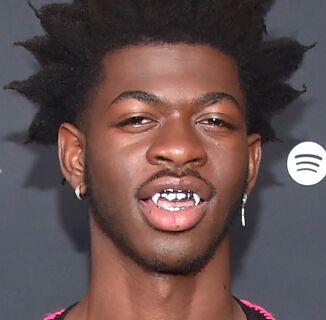Sex workers find themselves bereft of mainstream advocacy in the midst of unprecedented legislative and social peril in the wake of H.R. 1865, also known as “FOSTA.” FOSTA is a bipartisan billpassed by both houses of Congress and signed into law by President Trump on April 11ostensibly drafted to address sex trafficking online. It isand has beenunder widespread criticism by advocates of Internet freedom, freedom of speech, and sex works advocates.
As one of the loudest voices in sex work advocacy, INTO spoke to author, lecturer, and podcast/web series host Conner Habib to talk what got us to FOSTA, what’s at stake now that it’s a reality, and what we can do in its aftermath to save sex workers, the Internet, and ourselves.
What are the stakes for you, personally, with regard to FOSTA?
It’s largely not affected me, personally, on a bottom line level, except for… should I return to doing sex work other than pornography? That would really give me pause and make me really afraid to do that. I’ve just been doing a lot of community work around it since before it passed, and now certainly now that it’s a law, and seeing how it’s affecting others.
The oppression of sex workers affects everybody. And one of the reasons why that’s so is because, as an extremely vulnerable group of laborers, whatever the government decides to do to sex workers, it is testing out to do on everybody else. And that includes labor policies and Internet freedom and bodily autonomy. Sex workers are always a testing ground for oppression for others, and we have been for hundreds and hundreds of years.
Could you give an example?
In the U.S., you have something like Operation Choke Point, which was a government initiative that was meant to cut off bank accounts of people that were in “risky business.” So porn stars were having their bank accounts closed by the government. And the idea was that, “Oh, we don’t want banks to have excessive chargeback fees related to either money laundering or fraud or whatever.” But of course, these are porn performers who are having their bank accounts shut down. So they were testing out, in a real way, who they could just sort of institute that policy on arbitrarily, because the porn performers had nothing to do with it. The banks received the directives, but they were just like, “Well, I guess we’ll just shut them down.”
Another example is, say, Facebook and Instagram deciding that you can’t have any pornographic content on the platform. When you enter into social media, or any sort of online space, and they’re justfrom the beginning“These are the kinds of content you can’t have,” and then, it’s just agreed upon. But why would we agree upon that to begin with? I wrote an essay about this a long time ago called Fap for Freedom on Vice. It goes into it in more detail.
So, I think it’s in everybody’s best interest to say, “OK, so, what if we decided to collectively defendoutside of undocumented migrant laborersprobably the most vulnerable community of laborers in the country? What if we decided to put our efforts into defending them and working out what sexual freedom and labor rights look like for ususing sex workers as a templateand then building out our other movements from there?”

You’ve tweeted that, while FOSTA provides a unique opportunity as a rallying point, it emerged from a culture hostile to sex workers to begin with.
A lot of people have been saying all these new things that they’re seeing as restrictions on Internet freedom are related to FOSTA. Now, while I don’t doubt that a lot of these sort of new restrictions are related to FOSTAsome of them demonstrably so, like Craigslist shutting down its Personals section and saying, “We did this because of FOSTA”there are lots of other things happening that we might be tempted to link to FOSTA.
For instance, you can no longer send pornography through Google Drive. And that was always kind of on their books. But they have just stepped up the enforcement of it and a bunch of sex workers have said that they were seeing their content disappearing. The thing is, that policy was already in place before FOSTA was signed. And then, just as it was about to be signed, it was enforced a bit more, and we could link that to FOSTA if we wanted, or we could say “Well, Google has always had this policy, which was already oppressive, which was already a problem.”
Why should Google be using an algorithmwhich is what they sayto see if we’re using Google Drive to sell pornographic content to consumers? Totally legally, by the way? Why should they have that in place? It makes no sense. So FOSTA seems to have amplified some of these things, but we should notice that a lot of these things were already in place.
Why is porn a problem?
For me, personally of course, porn is not a problem. In fact, a large deal of the work I do is to offer a cultural reminder or reframe that porn is an art form. But people always think that porn is a problem to be solved, or a social issue. And that speaks more about our attitudes towards sex than anything else. And it finds so many pathways for that. It could be an outsider, a non-performer saying, “Porn only displays women in one way and that’s terrible,” or a mirror image of that, “Porn is racist because it only displays people of color in one way,” which, of course, can be a recapitulation of the anti-porn argument about portrayals of women. Of course, porn has all the problems of racism in labor practices and so on that any other form of art and entertainment has, but those problems are best expressed and articulated by performers and sex workers. It could be a problem in the sense of someone watching porn and enjoying it and then, suddenly after they come, being like, “Oh, you know, I just don’t feel so great about what just happened.” And, you know, it’s like, well… just maybe do some inner work instead of trying to project what your problem is onto the art that you just consumed or participated in.
I had this conversation with a gay man of size a few weeks ago whose proposed solution to body dysmorphia was to watch more porn with fat guys who were being romantic with one another and less “studio porn.” Something about that struck me as off. To me, porn is just another way we watch movies, and we’re not up in arms because people are getting shot in films.
Well, I think, in general right now, we have a real general cultural misunderstanding of what art is supposed to do. People should be able to look at porn whenever the fuck they want and not be afraid if porn pops up on their phone just ’cause they’re at work or on the bus or something like that.
I like watching straight guys get humiliated by femdoms. But is that something that I go after in my “real life”? No. That doesn’t represent the whole spectrum of my tastes, and it doesn’t include my body.
What you’re talking about overlaps with my revelation, like, two years in, when I started receiving fan mail from lesbians, and I was like, “Excuse me?” I didn’t get it at first. And I had to think about it for a really long time until I realizedwe don’t watch porn to see what we want to do all the time. And of course not. We don’t consume any other kind of art for that reason. Pornography gives us cues, and so this demand that somehow it be completely literal… I don’t think it’s reflective of how desire works in general. Why, for instance, should two guys having sex in a tent turn me on more than three guys having sex in a mansion? We’re turned on, we’re aroused, we’re excited by, we’re drawn to things that are often mysterious to us. And the idea that we know what our desires are all the time, I think that’s just such a Western and American thing.
People have sex workers in their lives all the time through pornporn is constantly in people’s eyeballs. There’s “representation” there. What role do you think representation plays in society’s attitudes about sex workers?
I think that your point is a point I try to make often, which is, “Look, we all interact with sex workers through pornography.” Viewers of porn make up the largest part of porn. So it’s important to look at what your interactions are and understand how common our interactions with sex workers are. We have ideas of, “There’s the sex worker, and then there’s me,” right? But, actually, maybe you go belong more in that relationship than you think you do. Now, that’s not just about identity and representation, but it’s about relationship. I would rather relate myself to people and see what that means. How do we resonate with each other? And that might also reveal to us the ways we resonate not just in privilege but in action. How are we like people that we want to exclude ourselves from because they’re terrible? I think we might learn something from that, too.
I have straight friends who aren’t able to see the political implications of buying into everything having to do with straight culture and outmoded feminism. And so I try to find little moments and these little ways of sort of gently prodding and offering new perspectives on sexual politics. Do you have anything to say on that?
I think you’re bringing up something in general, which is that the way certain specific heterosexual men and heterosexual women in a specific economic bracket have sex with each other and communicate sex is overwhelming the voices and contributions that different communities could bring to this. It’s crowding out the voices of sex workers simply by the ways in which women in the #MeToo movement, some of whom, you know, have experienced terrible things, are nevertheless using rhetoric like, “He wanted me to have sex with him for a job. I am not a prostitute,” using that as a pejorative, rather than saying, “What might sex workers have to contribute to this conversation about sex?” We literally work with sex. We’re professionals, you know. And as sex workers, we carry the burden of a culture that refuses to work on sex. So we see all kinds of things that other people don’t see. And we have an important voice to lend to these conversations. Let’s listen to new narratives, not just based on identity, but what narratives are actually new.
You’ve said that “porn is already ethical and feminist.”
So first of all, when people say that they want “ethical,” “feminist” porn, what that usually means is that the performers are getting paid less. So usually, what we’re talking about is exchanging better labor policies for some sort of idea of how porn is supposed to be. So I want to, first of all, call that out. That’s not always true, but very often, that’s true.
The second thing I want to say is there’s nothing unethical about pornography in and of itself. There’s not. And there are no problems in pornography that are not reflected in other other ways of making money in different kinds of jobs. There’s none. The only difference is the pressures that come from the outside. The only difference. I say that when someone reflexively says, “Well, you’re not going to get syphilis working at Starbucks.” Well, no, but you could get sick working at Starbucks. You could also get a disease working at a hospital. You could also get an injury while working, you know, building a building. Right? There’s no difference, internally. So why am I bringing that up? Because the idea that somehow porn has a singular ethical problem in its production is already misguided. We’ve already started off on the wrong foot when we say that porn is bad. It’s not, and it doesn’t have a singular problem compared to any other business, it just doesn’t. Porn, in fact, might have a much better ethical leverage. Sex work in general, but porn also, is much more ethical in terms of what what it’s doingwe know people desire this, so we’re going to do this. It’s not as alienating in the way that other modes of production are.
So there’s that, and then, also, when we talk about it being feminist. Well, isn’t there something feminist about women saying, “Hey, I have sexuality, I enjoy sex, so I’m going to just display and enjoy sex”? What does “feminist porn” mean in those regards? Also, isn’t porn carrying so much of the weight of feminism and ethics already in a way that so many other jobs and media forms and art forms are not?
The demands, the political, social demands on porn are higher than anything else, and that’s because people are always trying to solve a problem when there isn’t one there, except in their own relationship to sex. And that’s the problem they should be trying to solve, not by going into the external world and trying to arrange all the parts of pornography until it doesn’t feel pornographic anymore and completely represents their politics.

I was speaking to someone yesterday who said something about how you’ll watch porn and sometimes “you can just tell that the performer isn’t into it.”
And that was 15 years, not just one day on the set. It’s like, “What if I’m having a bad day and I have to work that day and my performance isn’t so great?” What I try to say is, “Instead of watching porn and thinking, ‘What can I do to save these people?’ you should be watching porn and saying, ‘What are these people doing to save me?’” They’ve been doing so much.
What would have to change, individually and culturally, for Americans not involved in the sex business to take up the mantle for sex workers’ rights?
First of all, it’s going to take personal responsibility for your own sexuality, and not just your sexual orientation, but your orientation to sex. You’re going to have to look deep into why you are attracted to and repelled by the things that you are. And why is that part of it? Because people’s response to sex work, and porn, and all kinds of issues around sex is so reflexive. So we need to stop being so reflexive around sex and be more contemplative.
And that doesn’t mean that you lose that spontaneous, exciting stuff. I’m not telling you to do it in a cultural waythat’s the way that we always try to do itsomehow arrange everybody so everybody is dissecting sex down to the last detail. No, no, no! I’m sayinglook at yourselves, explore your own likes and dislikes, and try to figure out why they’re there, and stop putting them so intensely on culture. So that way, when you have a conversation about sex and sex work, you’re not just going to be reflexively lashing out without any thought at all, because you’ve done some of that inner work.
The other thing you can do is understand that you may not be as qualified as you think you are to make pronouncements on sex work in any way, meaning, you might not know what the content of porn should be. You might not know how a sex worker should feel when they’re doing their work. You might not know any of those things because that requires a level of expertise, not just lived experience. If you don’t really have any knowledge about the history of porn, or porn aesthetics, or where porn came from, and you haven’t done years of scholarship on that, maybe keep your mouth shut about what you think should appear in porn, like you would for most other art forms.
So this is a very simple way of sayinglisten to sex workers. And I don’t just mean the one sex worker you talk to. I mean, listen to lots of sex workers. And listening means also really being open. It doesn’t just mean taking a statement as a bit of information that you can throw at other people at some point. It means really being open and listening, and being open to changing inside yourself when people speak.
But more to the point than any of that, even, iskeep a basic, basic fundamental principle that people are entitled to sexual freedom, and that we should have compassion for other people and their sexual desires, and that we don’t have the right to dominate each other’s desires.
And that, as long as we’re talking about things in a field of labor, do some work understanding Labor Studies and trying to transform your understanding of sex work into an understanding of work in general, and not making it a special case for some reason.
Help make sure LGBTQ+ stories are being told...
We can't rely on mainstream media to tell our stories. That's why we don't lock our articles behind a paywall. Will you support our mission with a contribution today?
Cancel anytime · Proudly LGBTQ+ owned and operated
Read More in Culture
The Latest on INTO
Subscribe to get a twice-weekly dose of queer news, updates, and insights from the INTO team.
in Your Inbox















